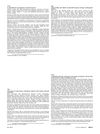January 2017 in “Nutrafoods - International Journal on Nutraceuticals, Functional Foods and Novel Foods” The supplement reduces hair loss and increases hair thickness in older women.
 January 2017 in “Springer eBooks”
January 2017 in “Springer eBooks” Over 40% of postmenopausal women experience hair loss, with treatments aiming to stop further loss and possibly thicken hair.
 January 2017 in “Jikken doubutsu ihou/Jikken doubutsu/Experimental animals/Jikken Dobutsu”
January 2017 in “Jikken doubutsu ihou/Jikken doubutsu/Experimental animals/Jikken Dobutsu” Mice with a changed Hr gene lose and regrow hair due to changes in the gene's activity.
 August 2016 in “Journal of Investigative Dermatology”
August 2016 in “Journal of Investigative Dermatology” Zinc deficiency disrupts hair growth and cycle, but zinc supplements can fix this.
July 2016 in “Journal of Dermatology and Cosmetic” Many people with hair loss have low vitamin D levels.

The document concludes that hair loss in women is complex, often linked to aging, health conditions, and nutritional deficiencies, and emotional impacts should not be underestimated.
 May 2015 in “Journal of The American Academy of Dermatology”
May 2015 in “Journal of The American Academy of Dermatology” The algorithm can effectively diagnose different types of female hair loss with proper history, examination, and tests.
 January 2015 in “Indian Dermatology Online Journal”
January 2015 in “Indian Dermatology Online Journal” The patient's hair loss is most likely due to diffuse alopecia areata.
July 2014 in “Faculty Opinions – Post-Publication Peer Review of the Biomedical Literature” AA-PRP injections significantly promote hair growth but need better study design for clear efficacy.

Hair loss can significantly affect mental health.
January 2014 in “Astrocyte” Some drugs may cause hair loss in women.
 November 2013 in “Faculty Opinions – Post-Publication Peer Review of the Biomedical Literature”
November 2013 in “Faculty Opinions – Post-Publication Peer Review of the Biomedical Literature” Injecting CD34+ cell-containing platelet-rich plasma can improve pattern hair loss more than placental extract treatment.
 August 2013 in “Pharmacy Today”
August 2013 in “Pharmacy Today” Viviscal may modestly improve hair loss in women without adverse effects.
 January 2013 in “Hair transplant forum international”
January 2013 in “Hair transplant forum international” Minoxidil and finasteride are effective for male hair loss; minoxidil also helps female hair loss, with some treatments needing more research.

The document concludes that hair loss in women can be caused by various factors and is managed with specific treatments like medication, therapy, and lifestyle changes.
 March 2012 in “Journal of The American Academy of Dermatology”
March 2012 in “Journal of The American Academy of Dermatology” Higher levels of certain nerve-related proteins are linked to hair loss in women with scalp pain.
 January 2012 in “Yearbook of Dermatology and Dermatologic Surgery”
January 2012 in “Yearbook of Dermatology and Dermatologic Surgery” Some African American women experience central scalp hair loss, often linked to a history of fungal scalp infection.
 January 2012 in “Human health handbooks”
January 2012 in “Human health handbooks” Low-level light therapy is FDA-approved for male pattern hair loss, increases hair count and strength, and is considered safe for use.

Recent discoveries have improved our understanding of hair loss, but challenges in treatment and knowledge among specialists still exist.

Low-level light therapy may reduce hair loss and improve hair quality but it's unclear who benefits most.
Treating hair loss in PCOS involves a combination of lifestyle changes, medication, and possibly hair care strategies.
October 2010 in “한국식품영양과학회 산업심포지움발표집” Fermented Liriope platyphylla helps hair grow in mice with hair loss.
December 2008 in “中華皮膚科醫學雜誌” The man's hair loss was due to syphilis, and his hair regrew after treatment.
 January 2007 in “Journal of The American Academy of Dermatology”
January 2007 in “Journal of The American Academy of Dermatology” Eating disorders can cause hair loss in patients.
January 2006 in “International Journal of Dermatology and Venereology” Stress can cause and worsen hair loss, so managing stress is important for better hair health.
March 2005 in “Journal of the American Academy of Dermatology” Hair loss affects men's physical health and women's mental health differently.
January 2004 in “Chinese Journal of Medical Aesthetics and Cosmetology” Hair transplantation is effective for seborrheic hair loss if done carefully.
 April 1998 in “Journal of women's health”
April 1998 in “Journal of women's health” Hair loss in women is often due to hereditary conditions or stress, and while treatments like minoxidil can help, diagnosis and management require medical guidance.

A man had temporary hair loss after a spinal cord injury, with some permanent thinning remaining.
 March 1983 in “Annals of Internal Medicine”
March 1983 in “Annals of Internal Medicine” 5-Aminosalicylic acid enemas may cause immediate hair root damage and hair loss.



















